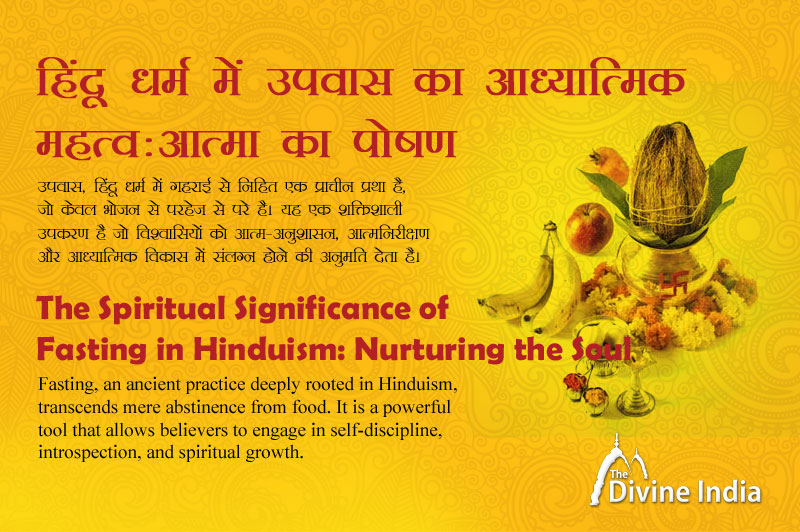


Fasting, an ancient practice deeply rooted in Hinduism, transcends mere abstinence from food. It is a powerful tool that allows believers to engage in self-discipline, introspection, and spiritual growth. This practice holds profound significance, fostering a deeper connection between the physical, mental, and spiritual realms.
Fasting involves refraining from consuming food or certain types of food for a specific period. This physical discipline serves as a means to detach from material desires and worldly cravings. By directing the energy usually devoted to eating towards spiritual endeavors, individuals can experience heightened focus and awareness.
Fasting purifies the body by giving the digestive system a break, allowing it to detoxify and rejuvenate. The same principle applies to the mind: abstaining from external distractions and focusing inward aids in clearing mental clutter, promoting clarity, and creating space for profound spiritual experiences.
Hinduism recognizes the cyclical nature of time and the importance of aligning human actions with the rhythms of the universe. Fasting during auspicious days, such as Ekadashi or religious festivals, is believed to intensify the spiritual energy of those moments, aiding practitioners in their spiritual endeavors.
Fasting enhances meditation by minimizing physical distractions. The heightened state of awareness resulting from fasting can lead to deeper meditation experiences, providing insights into one's true nature and fostering self-realization.
Fasting promotes self-control, breaking the chains of attachment to sensory pleasures. The ego often thrives on indulgence; fasting challenges this egoic attachment, facilitating a sense of humility and self-transcendence.
Fasting is viewed as an offering and sacrifice to the divine. By voluntarily giving up food, devotees symbolize their devotion and surrender to higher spiritual truths, acknowledging the impermanence of physical needs in the face of spiritual pursuits.
Experiencing physical hunger can cultivate empathy for those who face food insecurity regularly. Fasting awakens a sense of compassion, encouraging individuals to help the less fortunate and engage in acts of charity.
The ultimate goal of fasting is not just abstaining from food but transforming the inner self. Fasting challenges beliefs, habits, and attachments, leading to a heightened awareness of one's motivations and actions.
Fasting in Hinduism is more than a ritual; it's a pathway to spiritual elevation and self-discovery. Through self-discipline, self-purification, and focused devotion, fasting becomes a catalyst for profound spiritual growth. By aligning physical abstinence with the pursuit of inner enlightenment, practitioners embark on a journey that nurtures the body, mind, and soul, ultimately bringing them closer to their spiritual essence.
Fasting is a practice in Hinduism that promotes spiritual growth through self-discipline, detachment from desires, and focused introspection. It detoxifies the body and mind, aligns practitioners with cosmic rhythms, and facilitates self-realization through enhanced meditation experiences.
Self-discipline is central to fasting in Hinduism. By refraining from food, individuals exercise control over physical desires, redirecting their energy towards spiritual pursuits, which strengthens willpower and promotes a sense of inner mastery.
Fasting involves abstaining from physical nourishment, serving as a tangible reminder of the impermanence of material pleasures. This detachment from sensory indulgence allows practitioners to focus on inner well-being and spiritual elevation.
Fasting minimizes distractions and physical sensations, facilitating deeper meditation experiences. The heightened state of awareness can lead to self-realization, insights into one's true nature, and a stronger connection with the inner self.
Hinduism emphasizes the importance of aligning human actions with the rhythms of the universe. Fasting during specific auspicious days, such as Ekadashi, is believed to intensify spiritual energy, aiding in profound spiritual experiences.
Fasting is viewed as an offering and sacrifice to the divine. By voluntarily giving up sustenance, devotees express their devotion and surrender to higher spiritual truths, symbolizing humility and commitment.
Yes, fasting can cultivate compassion. The experience of hunger can evoke empathy for those who regularly face food insecurity, prompting acts of kindness and charitable deeds.
The ultimate goal of fasting is to nurture the body, mind, and soul. By aligning physical abstinence with spiritual pursuits, practitioners deepen their connection with the divine, fostering holistic well-being and spiritual growth.